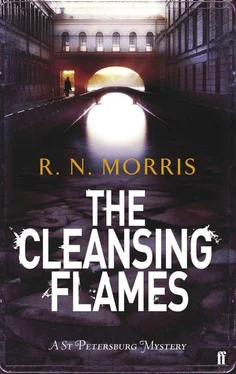R. Morris - The Cleansing Flames
Здесь есть возможность читать онлайн «R. Morris - The Cleansing Flames» весь текст электронной книги совершенно бесплатно (целиком полную версию без сокращений). В некоторых случаях можно слушать аудио, скачать через торрент в формате fb2 и присутствует краткое содержание. Год выпуска: 2011, ISBN: 2011, Издательство: Faber and Faber Fiction, Жанр: Исторический детектив, на английском языке. Описание произведения, (предисловие) а так же отзывы посетителей доступны на портале библиотеки ЛибКат.
- Название:The Cleansing Flames
- Автор:
- Издательство:Faber and Faber Fiction
- Жанр:
- Год:2011
- ISBN:0571259154
- Рейтинг книги:5 / 5. Голосов: 1
-
Избранное:Добавить в избранное
- Отзывы:
-
Ваша оценка:
- 100
- 1
- 2
- 3
- 4
- 5
The Cleansing Flames: краткое содержание, описание и аннотация
Предлагаем к чтению аннотацию, описание, краткое содержание или предисловие (зависит от того, что написал сам автор книги «The Cleansing Flames»). Если вы не нашли необходимую информацию о книге — напишите в комментариях, мы постараемся отыскать её.
The Cleansing Flames — читать онлайн бесплатно полную книгу (весь текст) целиком
Ниже представлен текст книги, разбитый по страницам. Система сохранения места последней прочитанной страницы, позволяет с удобством читать онлайн бесплатно книгу «The Cleansing Flames», без необходимости каждый раз заново искать на чём Вы остановились. Поставьте закладку, и сможете в любой момент перейти на страницу, на которой закончили чтение.
Интервал:
Закладка:
He wondered whether this momentous event had played a part in his correspondent’s choice of meeting place, consciously or otherwise.
Porfiry thought back to the trial of Raskolnikov, without doubt the murderous student referred to in the anonymous letter. The courtroom had been crowded with the gentlemen of the press, scrutinising his every word and even gesture. That was to be expected: Raskolnikov’s crime, sensational enough in itself, had been interpreted as having a wider significance. It had been seen as a symptom of the nihilistic disease that was corrupting the younger generation at the time, and that had, if anything, become more virulent in the years since. Karakozov’s assassination attempt had been made the following year. How the state dealt with Raskolnikov was to be seen as a litmus test for how it would deal with all its malcontent young men. Too much leniency would provoke the reactionaries; excessive severity would incite the radicals.
As always in Russia, a matter of justice had become a political battleground: Porfiry had found himself caught in the middle.
He tried to picture the journalists’ faces. Had there been one among them whom he could identify as the writer of that letter? One man in whose eyes he had noticed a particular sympathy, the beginnings of a bond perhaps?
It seemed so long ago now. And at the time, he remembered, he had made a conscious effort to block out their faces, not to mention their pencils, sharpened for blood, hovering over their notebooks. If he had thought too much about what the press were going to write about him, he could not have done his job. He concentrated instead on the humanity of the young man whose terrible error had brought him to that courtroom. Yes, his error was grievous, his crimes appalling. But he was still a man. A human heart beat within his breast. He possessed a soul, one that had become infected with ideological disease admittedly, but a soul nevertheless. A soul capable of being saved. Indeed, it was the duty of all those older, wiser heads charged with the administration of justice — judges, prosecutors, defence attorneys, all — it was their duty to work together urgently to bring about this salvation. Porfiry had come to believe that Raskolnikov’s soul was nothing other than the soul of Russia’s youth. If they turned their back on him, they turned their back on a whole generation — on the future, in fact.
And so, with this thought in mind, he had called for clemency. He had joined with those who urged that the accused be treated with compassion, as one suffering from a mental derangement.
In short, he had not called for the maximum sentence. Further, he had himself brought to light many of the strange psychological contradictions in the case that had helped to convince the jury of Raskolnikov’s insanity and had so led to mitigation in sentencing.
Which of those journalists, he now wondered, would have viewed this conduct with approval? Porfiry paused in his circuit. He closed his eyes and tried once again to bring their faces to mind. Nothing. However, he felt sure that he would immediately recognise the individual should he come towards him now. He opened his eyes and looked about him hopefully. There were not many people about (why would anyone come to the Summer Garden when it was closed?), but none of the faces he saw struck a chord.
Porfiry took the letter from his pocket. The line he wished to consult was, ‘It might have surprised you to read such an account in such a journal.’ What could the writer have meant by that? he wondered.
He folded the letter along its creases and returned it to his pocket. He had not yet completed his circuit and was still early for the meeting; nevertheless, he turned and headed back to the northern gate.
He looked expectantly into the faces of everyone who approached, including the women, and even, rather foolishly, the children. Not once did he feel any glimmer of recognition. More to the point, it was clear that no one recognised him.
Sudden activity within the park drew his attention: the squeak of a handcart being pulled around by couple of workmen in long artisan’s waistcoats. Porfiry was unduly excited to see that they were about to take the covers off the statues. He watched as they picked away at the first of the sheets, pulling it away to reveal a female figure, in the classical style, semi-naked but nondescript. An allegory. Porfiry had to admit he was disappointed. She did not leap from the podium and run along the main avenue, her laughter tinkling stonily like dropped pebbles. Porfiry smiled at the fanciful image, which his imagination further embellished with the fantasy of the two workmen giving chase. In reality, the men simply busied themselves with folding up the redundant sheet, which they placed in the handcart, before moving on to the neighbouring sculpture.
Porfiry studied the statue that had been uncovered, wondering what the allegorical figure represented. She was depicted holding some kind of weapon, a rod or a sword of some kind. Of course, Porfiry realised, that was the fasces , the bundle of rods that symbolised the state’s authority, a symbol also — as he well knew, being a magistrate — of its summary judicial power. Ah yes, he had contemplated this figure before, somewhere, if not here; drawn to it, perhaps, because of its particular relevance to him. She was Nemesis.
Porfiry consulted his watch again. It was now a quarter past the hour. He looked about him, his expectancy turned to unease, remembering another sentence in the letter. ‘If this letter falls into the wrong hands, I will be dead by the time you come to meet me.’
He would give it till four o’clock, he decided.
Chits
When Porfiry returned to his chambers later that afternoon, he found a small crowd of his colleagues already gathered there. As he entered the room, the mood of excitability that was clearly prevalent changed instantly. Everyone fell conspiratorially silent, regarding him with a mixture of glances, some guilty, others amused, but most pitying. He noticed, however, that they were unanimous in avoiding his eye.
He hung his coat on the stand without saying a word. Facing the room again, he acknowledged Nikodim Fomich’s presence with an unsmiling nod. The chief of the Haymarket District Police Bureau received the greeting with a wince. His was the most pitying expression of all.
Also there was Virginsky, together with the clerk Zamyotov, as well as a number of other magistrates and clerks. There were about eight or nine men in all; perhaps not enough to truly constitute a crowd, but when he had first entered, their frenzied activity and agitated shouts had given the impression of a much larger gathering. Besides which, his chambers were not large.
One or two of the men thought it best to make their escape at this moment, almost tiptoeing out of the room. The remnant assembled suspiciously around his desk. They seemed to be united in their determination to prevent him from seeing whatever was on it.
Porfiry looked enquiringly to Virginsky for an explanation.
‘There has been a slight mishap. An administrative error, one might say.’
‘It was his fault,’ put in Zamyotov, quickly.
‘That’s not entirely true, Alexander Grigorevich, and you know it!’ countered Virginsky.
‘An easy enough mistake to make,’ smoothed Nikodim Fomich, ever the genial uncle.
‘What has happened?’ enquired Porfiry.
‘It is to do with the poster,’ began Virginsky. ‘Technically, Imperial State has done an excellent job, considering the time in which they managed to produce the posters. The reproduction of the photograph is excellent.’
Porfiry took a step forward. The men shielding his desk bristled and closed ranks.
Читать дальшеИнтервал:
Закладка:
Похожие книги на «The Cleansing Flames»
Представляем Вашему вниманию похожие книги на «The Cleansing Flames» списком для выбора. Мы отобрали схожую по названию и смыслу литературу в надежде предоставить читателям больше вариантов отыскать новые, интересные, ещё непрочитанные произведения.
Обсуждение, отзывы о книге «The Cleansing Flames» и просто собственные мнения читателей. Оставьте ваши комментарии, напишите, что Вы думаете о произведении, его смысле или главных героях. Укажите что конкретно понравилось, а что нет, и почему Вы так считаете.












